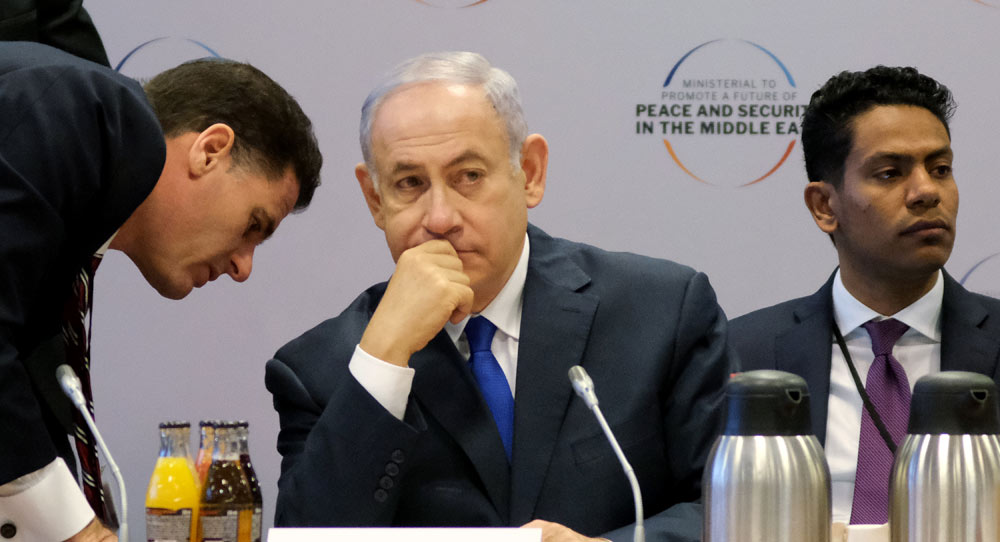Israel’s prime minister is a lucky man.
At least by his standards.
Forget that he is dogged by corruption scandals and faces reelection, which will be an uphill struggle.
Forget too that he is repeatedly criticized by the EU for expanding illegal Jewish settlements in East Jerusalem and the occupied West Bank. Such policies undermine, if not make impossible, a negotiated and viable two-state solution in Israel and Palestine. With unconditional support from the Trump administration, Netanyahu has been able to plough further, literally and politically, into the West Bank.
And with support from the V4, or the Visegrád countries (which consist of Poland, Hungary, Slovakia, and the Czech Republic), Netanyahu has relied particularly upon Warsaw and Prague to bloc much tougher EU measures against Israel’s settlement policies.
So, to the consternation of the Polish government, which recently pulled out all the stops to host a Middle East conference that had Israel and several other countries sitting at the same table, Netanyahu humiliated his hosts.
Apart from arriving late and changing the seating arrangements—which his Polish hosts could just about accept—the prime minister really did upset them with his statements about their country’s role in the Holocaust.
“The Poles cooperated with the Germans” during the Holocaust, Netanyahu said. Back home, in Jerusalem, the interim foreign minister, Israel Katz, said Poles “suckled anti-Semitism with their mother’s milk.” It was too much for the Polish government.
Polish Prime Minister Mateusz Morawiecki was furious. He criticized Katz for “reprehensible, unacceptable, and simply racist words.” He told reporters that “this is an example of racist anti-Polonism.”
The upshot was that Poland, followed by the Czechs, pulled out of a V4-Israel summit planned on February 18-19 in Jerusalem. The meeting was written off.
This cancellation was not in Israel’s interests.
Over the past several years, ties between Israel and the V4 have deepened. What continues to bind them much more closely is the shared views about the EU’s policies on migration (which neither side likes), the status of Jerusalem, security, threat perceptions, and what remains of the so-called peace process.
Moreover, Netanyahu’s nationalist policies, his curbing of non-governmental organizations, and his overall view of the EU’s liberal policies and values resonates with most of the Central Europeans. Indeed, the Hungarian, Jewish-born philanthropist George Soros has been demonized by Netanyahu, much to the delight of Hungarian Prime Minister Viktor Orbán.
Furthermore, the Czech and Hungarian parliaments have supported Israel by rejecting the labelling of Israeli goods originating in the settlements. Hungary and the Czech Republic blocked a joint EU statement condemning the U.S. embassy move to Jerusalem. V4 governments often abstain from voting in the U.N. General Assembly when it comes to Israeli-Palestinian issues. In short, the V4—especially Warsaw and Prague—have been consistent in challenging the EU’s policies toward Israel.
And on important issues such as economic cooperation, during the V4-Israel summit in Budapest in 2017, lots of issues were on the table: transfer of Israeli technology, security cooperation, innovation, and artificial intelligence.
“The V4 are looking for Israeli technological expertise and trade and in return they can provide the cheap, yet qualified labor force that is needed by innovative Israeli industries,” wrote Joanna Dyduch in a recent report by the German Institute for International Affairs. Yet for all that, V4 hasn’t broken ranks over the EU’s support for saving the Iran nuclear deal.
Given these special ties with the V4 countries and their role in the EU, Netanyahu’s public criticism of Poland is puzzling.
Yes, he can use his comments for electoral reasons back home. But could it change Poland's polices toward Israel in the EU? And what about the impact back in Poland and its relations with the Jewish community? Won’t there be a backlash, especially among supporters of the governing nationalist Law and Justice Party led by Jarosław Kaczyński?
“Jews still feel safe here,” said Eugeniusz Smolar from the Center for European Relations in Warsaw. “There is verbal anti-Semitism and especially on the internet. I do worry about the impact. But look what is taking place in France.” There, physical attacks on Jews have increased, not to mention what is happening in the United Kingdom, where anti-Semitism is becoming a dangerous phenomenon in the political discourse, especially in the opposition Labour Party.
What is even more surprising about Israel’s criticism of Poland’s treatment of Jews during the Nazi occupation is that both countries tried to move on after the Warsaw government last year issued a law in which anyone making claims about Poland’s responsibility for Nazi crimes would be punishable by law. A justifiable furor followed in Israel but also in Poland.
Leaving aside Netanyahu’s and Katz’s comments, this spat is really about the past and memory. It is about how to deal with the Holocaust, which destroyed the Judeo-Christian tradition. In all its forms and tribulations, that symbiosis shaped Europe until 1938. Brandishing statements and instrumentalizing the past do little to address what is happening today among the Jewish communities in many European countries.








